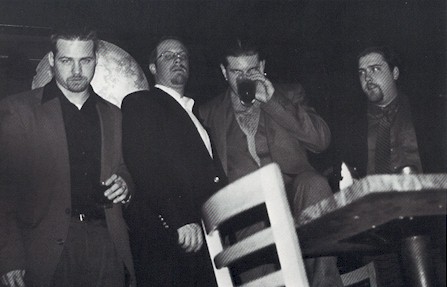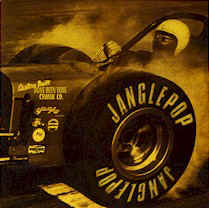With a love for '80s college rock, black suits, and KISS,
Janglepop takes their hybrid sound from CD to stage.
|
 |
|

Men in Black
|
I rolled into
the Ranch Bowl at about 9 p.m. and the place was just starting to fill up. The
"event" was the well-publicized party for Janglepop's new CD, Ductwork
Shakes. I didn't have tickets to the show, and there was no "list" (as in,
"I'm on the list," which nine times out of 10, doesn't get you in the door
because the band always forgets to add your name to it.) Being a poorly paid writer for Lazyeye,
I didn't want to shell out $10 to get in; I needed to find someone who knew the band. The
only clue to their identities -- they'd be wearing black sport coats.
"It's kind of a new 'look' we're trying on," said vocalist/bassist Chuck
Davis, the only Janglepop member I was able to track down, thanks to finding his phone
number on the band's website. "We're kinda thinkin' that it will help us stand out
from other bands."
"So you want to be known as 'The guys who wear black sport coats'?"
"Yeah… well, not really," Davis said. |
"Black is a slimming color. It's just a
good look. People tend to notice you."
|

|
Ductwork Shakes, the band's
latest album... |
|
|
It was too
late for that. I began asking if anyone had seen any rock 'n' roll types wearing black
suits. One guy stood out; he chatted with the bouncer at the door, he wore a black sports
jacket. He was startled when asked if he was a member of Janglepop. But it turned out he
knew the band ("from way, way back"), and he trotted off to find them.
Before long, I was sharing a booth in the quiet little bar across the hall from the
Ranch Bowl's main stage with three guys in black suits who looked like hip accountants, or
lawyers. The standout was drummer Chad Rolles – no suit! And as a result, he looked
like he was in a rock band.
With an hour or so to kill before going on stage, they explained the black suit
phenomenon, while one-by-one, a string of friends and fans dropped by the table and shook
hands. "I'm kinda fat," said lead guitarist and rock purist Rob Rutar, "and
dumb looking. Black is a slimming color. It's just a good look. People tend to notice
you."
The only attention-getter the band really wanted, however, is its old-school approach
to rock 'n' roll. Old school as in the '80s, as in R.E.M., grunge and power pop ballads.
Together since '93, Janglepop has slowly attracted a small army of fans who like their
take on the jangly '80s-style pop.
Ductwork Shakes is the band's second CD, a follow-up to 1996's "Pusher
Type," also released on local indie label Emma Peel Records. The CD didn't get much
attention, except from Davis, who at the time had just split with his former band, Blah
Buddah. When Janglepop lost their original bass player, they asked Davis to join.
"I said 'no' at first," he said. "Then Pusher Type came out and
it changed my mind. I figured I was way ahead of those guys, until we played together,
then I realized I had I lot of catching up to do."
"When we first started playing live, we weren't very good," said guitarist
and co-lead vocalist Jeff Bell. "We were just playing to party. We've gotten better
over time."
"We still have the mentality that we're not good enough, and still shock ourselves
whenever we do something well," Davis added. |
|
|
Just then, an
acquaintance of Rutar's walked up to the table and presented him with what appeared to be
a large jigsaw puzzle of KISS's Destroyer album cover. Rutar grinned and thanked
the guy and explained how he's the biggest KISS fan on the planet.
"I even met Gene (Simmons) and Ace (Frehley)," he said, grinning.
"Before I had moved back to Omaha, I worked for IRS Records in California. Gene
called the office to pitch a band to the label. He went into this whole dissertation about
where music is and where it was going. All's I could think of was, 'I'm talking to Gene
Simmons.'"
His brush with Frehley happened shortly after getting a KISS tattoo on his leg. He and
a buddy traveled to Kansas City to see Frehley perform, but were thrown out of the venue
before he hit the stage. Like a true groupie, Rutar sat outside the venue's back entrance
for more than two hours to get the KISS guitarist's autograph. "Ace came out and
said, 'I've got time to sign one thing.' The same bouncers who had thrown me out of the
club hours earlier picked me up and carried me into Ace's van, where he signed my tattoo,
then they carried me back out."
Believe it or not, Rutar has since washed his leg, but "got a picture of the
autograph before I washed it off." The consummate rocker, Rutar also counts The Who
and Led Zeppelin as favorites. The rest of the band, however, doesn't share his taste in
music. Bell and Davis are both fans of big '80s college rock bands like R.E.M.,
Lemonheads, the Pixies, "the modern, arty pop stuff," Davis says. Rolles said he
listens to everything, from jazz to pop.
All the influences are brought together on Ductwork Shakes. A nice sounding, rather
tame, old-school nod to rock 'n' roll, with some interesting grunge touches thrown in for
good measure. Recorded throughout the first half of '98 after winning free studio time in
a Battle of the Bands contest, Davis called the CD "a good, clean album with lots of
us on it. We were just going to make it an EP, but we had plenty of songs lying
around."
One of the stage guys comes in and signals it's time to go. "This is like a
graduation party," said Rutar as he finished his softdrink. "It's a validation
to anyone who doubts our seriousness, or that we want to do this for a living." |
"We still have the mentality that we're
not good enough, and still shock ourselves whenever we do something well."
|
The band is so much better live, you
have to wonder why they even bothered releasing the CD.
|
The club was
relatively packed by the time Janglepop got on stage. An all-ages show, there were maybe
60 or so youngsters sitting in front of the stage, sipping diet cola and smoking
cigarettes. Meanwhile, most of the crowd of 300 was crammed uncomfortably behind a
plastic, fluorescent-orange snow fence that acted as a barrier between the drinkers and
the underaged.
Two minutes after the black-suit boys strapped on their guitars it was glaringly
obvious that the new CD in no way captured the band's sound or intensity. In fact, the
average listener would be hard pressed to identify the band on Ductwork Shakes
as the one performing on stage.
Janglepop live is much, much more cutting edge, angry, and ultimately, bitchier than
anything they've recorded. Rutar and Bell's twin guitars cut and rumble King-Kong-sized
rock-and-roll riffs that push the barrier from college pop to heavy metal and, at times,
punk. The band has managed to take their love of the Pixies and R.E.M. and cut out a
unique sounding modern hybrid that still gives a nod to Rutar's heavy-metal heroes. The
band is so much better live, that you have to wonder why they even bothered releasing the
CD.
Of course, three songs into the set, the jackets are off. Everyone wears a black shirt,
except Rutar, who wears a shirtless black vest that exposes a gold medallion and excessive
chest hair. While Davis and Bell look like J Crew catalog college kids with their short
hair and grunge-era beard/mustache combinations, Rutar is the incarnation of the '80s
heavy metal rock guitarist with his ponytail swinging to the beat, eventually donning a
kooky top hat Slash-style.
The crowd eats it up. |
|
|
A week later,
Janglepop is about to go on stage again, this time at the 49'r. What's missing? The black
jackets. Instead, Rutar wears a satiny black shirt with "Dragonlady Sushi Bar"
embroidered on the back in red. Bell is in his typical black longsleeve shirt, Davis, who
walked around in a jacket, takes it off before the performance and sweats through a
conservative, white office-style dress shirt. Rolles wears a black Misfits T-shirt. So
much for stage presence.
Rutar's nervous. The show is a party of sorts for his 29th birthday. He
seemed as cool and calm as he did before the Ranch Bowl gig. "Actually I was really
nervous. I get nervous every time I go on stage. I feel like a rubber band being
stretched, about to snap," he says, pulling back on an imaginary slingshot.
The band charged into their set as the crowd of about 100 watched on, occasionally
glancing up as Cuba Gooding Jr. hosts Saturday Night Live on a big-screen TV hanging over
Rolles' drum kit. Bell broke a guitar string on the first song, an omen probably. Feedback
rang through the amps throughout the set and a couple sound guys darted around trying to
figure out where it came from.
"Those who saw us at the Ranch Bowl last week saw a finely honed rock
machine," Davis says. "This here's more like it."
It would be a long, one-hour set. The band played as well as they had a week earlier
but couldn't do anything about the poor sound system except apologize after almost every
song. Toward the end, Bell broke his guitar strap, then ditched the guitar and sang while
teetering atop a chair. He ended the song by throwing the chair across the stage into an
amp.
It's just another show, but for Janglepop, it's how they plan to spend the rest of
their lives. All have other jobs – Rutar's as a bartender at Chilis, Bell works at V
Mertz, Rolles at Greater Omaha Refrigeration -- the only "real" job among them.
Davis, meanwhile, is an unemployed graphic artist torn between rock and roll and real
life. "I've got one foot in the rock world, one in the corporate world," he
said. "Up to now, the band has been a nonprofit organization. Eventually we have to
take a leap of faith and quit our jobs and do gigs."
Or get real jobs. "I'm 29 now," Davis said, "and I read in Rolling
Stone that if you haven't signed a record contract by the time you're 30, give
up. I'm not willing to do that, but at some point I'll have to make a decision. If I quit
today and got a full-time job, I'd always wonder 'what if?'"
Back to 
Printed in The Reader May 14, 1999.
Copyright © 1999 Tim McMahan. All rights reserved. |
"Those who saw us at the Ranch Bowl last
week saw a finely honed rock machine," Davis said. "This here's more like
it."
|
|

![]() webboard
interviews
webboard
interviews